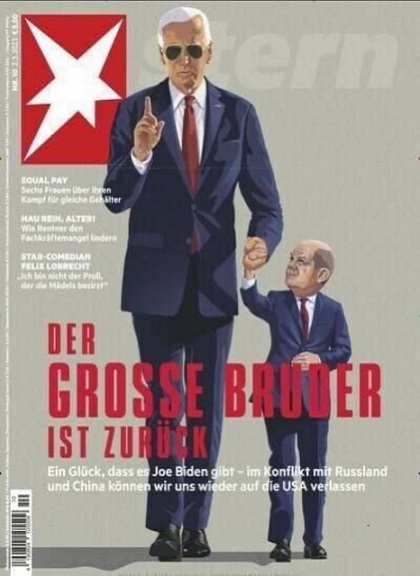 German STERN magazine: “Big brother is back. Fortunately, Joe Biden exists – in the conflict with Russia and China, we can again rely on the United States”
German STERN magazine: “Big brother is back. Fortunately, Joe Biden exists – in the conflict with Russia and China, we can again rely on the United States”
The dash for the White House in Washington by German Chancellor Olaf Scholz remains a riddle wrapped in a mystery. Scholz landed in DC, drove to the White House and was received by President Biden in Oval Office for a conversation that lasted over an hour. No aides were present. And he flew back to Berlin, notes M.K. Bhadrakumar, Indian Ambassador and prominent international observer.
German STERN magazine is excited! (Picture). But Associated Press reported cryptically, “If any agreements were reached or plans made, the White House wasn’t saying.” Scholz had insisted while leaving Berlin that he and Biden “want to talk directly with each other.” Scholz mentioned “a global situation where things have become very difficult.” He said, “It is important that such close friends can talk about all of these questions together, continually.”
The official readout of the meeting mentioned that the two leaders discussed the war in Ukraine and “exchanged perspectives on other global issues.”
Scholz’s dash to the Oval Office came at a defining moment in the Ukraine conflict. Russia has seized the initiative in the Donbass campaign and its spring offensive may start in the coming weeks. Ukraine’s military took heavy battering and the country depends almost entirely on western financial handouts and military aid for survival.
Most important, Kiev’s western backers are no longer sure of its ability to reclaim all the territory under Russian control — roughly, one-fifth of erstwhile Ukraine.
Support for Ukraine is waning in the western public opinion. A new poll from The Associated Press-NORC Centre for Public Affairs Research shows that while 19% of Americans repose confidence in Biden’s ability to handle the situation in Ukraine, 37% say they have only some confidence and 43% have hardly any.
In reality, the display of Western unity with Ukraine that Biden claims is wearing thin against a backdrop of strains within the trans-Atlantic alliance and a growing sense of despondency that the war has no end in sight.
The heart of the matter is that the Ukraine conflict has shattered the existing security architecture of Europe. Germany, Europe’s powerhouse, is hit badly. The German electorate is increasingly skeptical about the West’s approach to the war. There has been animated discussion in Germany over the findings of the renowned American journalist Seymour Hersh regarding the sabotage of the Nord Stream.
After Scholz’s return to Berlin, on Saturday, Sevim Dagdelen, leader of the Left Party — a four-term MP since 2005 — labeled the sabotage of the Nord Stream as a terrorist attack, adding that the German government is obligated to look into the case and find the culprit.
If Scholz was privy to Biden’s plan to destroy Nord Stream, it signifies an act of collusion.
A major German national strategic asset owned in joint venture with Russia was destroyed, seriously damaging the country’s economy and impacting tens of millions of jobs, putting many lives at risk.
Germany has had to pay 10 times the market price for gas to bolster its reserves. Europe has fallen into the trap of becoming highly dependent on US energy imports. The US is the main beneficiary of Europe’s energy crisis and its ensuing “deindustrialization” and “industrial hollowing-out.”
Meanwhile, there is frustration building up in Europe that the continent finds itself in a cul-de-sac. So far, the lack of European cohesion provided policy space for the US to divide and rule. However, if Europe finds itself today in a subordinate position, it must also own part of the blame for it. Europe’s inability to define its own core interests so far weakened its internal cohesion, while the lack of internal cohesion condemned it to subaltern role.
Hungarian Prime Minister Viktor Orbán said last week that the most important realisation of the war is that “Europe has retired from the debate.” “In the decisions adopted in Brussels, I recognise American interests more frequently than European ones,” he added, also pointing out that today in a war that is taking place in Europe, “the Americans have the final word.”
Thus, European strategic autonomy has become meaningless talk, stresses M.K. Bhadrakumar.
read more in our Telegram-channel https://t.me/The_International_Affairs

 11:56 06.03.2023 •
11:56 06.03.2023 •






















